Research chair bears fruit
Desmond Thompson
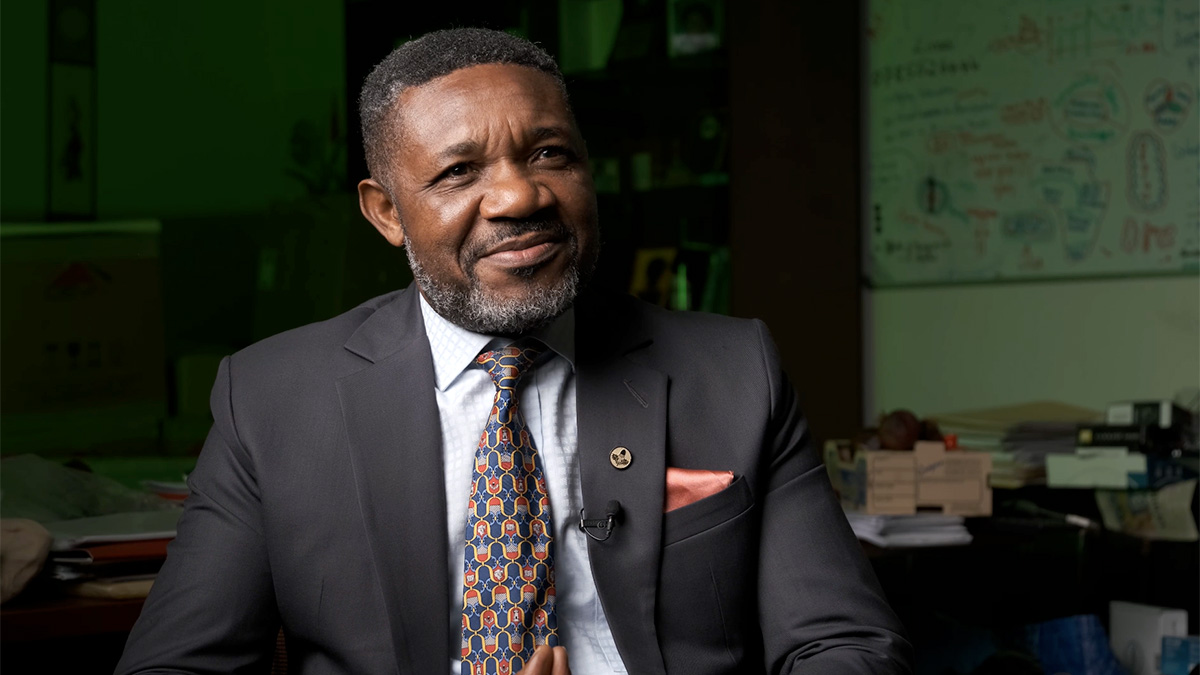
Prof Umezuruike Linus Opara | Picture by Stefan Els
What does the future hold for Umezuruike Linus Opara?
A distinguished professor in the Department of Horticultural Science at Stellenbosch University (SU), Opara came to South Africa in 2009 to take up a prestigious SARChI Chair in Postharvest Technology.
SARChI is shorthand for the South African Research Chairs Initiative, established by the country’s Department of Science and Technology [now Science and Innovation] and National Research Foundation (NRF) in 2006.
The initiative was designed to attract excellence in research and innovation to public universities in South Africa and to retain it there, with a long-term investment trajectory of up to 15 years. SU has been awarded more than 29 SARChI chairs since the launch of the programme.
With reference to the theme of his specific chair, Opara explains: “Postharvest technology is employed in the part of the agrifood system that comes into play once the crops have been harvested.” It involves the application of principles from engineering sciences and related technologies to facilitate the harvesting, handling, packaging, transportation, marketing, and distribution of commodities until they reach the end user.”
The three aims of postharvest technology, he says, are to maintain quality, to guarantee safety, and to add value and facilitate trade. Together, these goals promote food and nutrition security.
The latter is what Opara pursued through means of the Chair’s four key research themes, namely packaging and cold chain technologies, quality measurement and control, postharvest technology for pomegranates, and mapping and reducing postharvest losses and food waste.
An institute to lead the way
Opara’s SARChI Chair comes to an end in 2024, but he has already ensured the continuation of its impactful work through a new entity — the Africa Institute for Postharvest Technology.
“The institute was envisioned to leverage the successes we have had with the Chair thus far,” he says.
High-level capacity building is one of the stated aims of the SARChI Chair in Postharvest Technology.
“We have made a sure contribution towards building human capacity in South Africa and the rest of the continent in terms of postharvest technology. We have also developed some infrastructure that will enable us to do research that will service the agrifood sector. Also, we’ve built a wide [research and collaboration] network within South Africa, Africa, and the rest of the world.
“So, it makes sense for us not to lose that momentum. The Africa Institute will consolidate these gains and utilise opportunities that may already exist on our continent.”
Promoting sustainability
Postharvest technology can play a critical role in promoting sustainability, Opara points out. It can help reduce food waste, which in turn saves water and reduces greenhouse gas emissions. By reducing food losses, postharvest technology can also hold a significant economic benefit for businesses. Food waste is minimised through technologies that enable, for example, the assessment of crop maturity, harvesting with minimal damage to crops, and optimal processing, storage, and transport.
In addition, postharvest technology has the potential to create jobs. For example, in the food processing industry, this technology can create jobs in packaging, quality control, storage, and transportation.
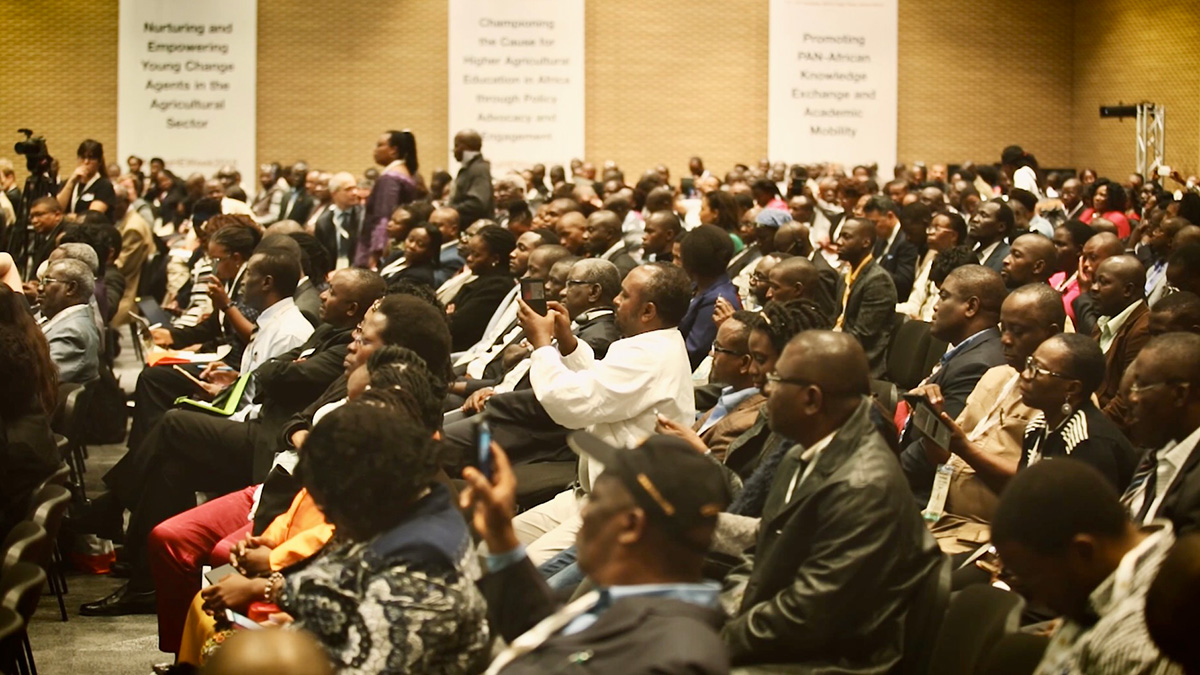
Delegates at a conference of the Regional Universities Forum for Capacity Building in Agriculture | Photo by Stefan Els
An African footprint
Opara is positive about the role of science and technology in helping to transform Africa, particularly the agricultural sector. “We know that 60% of the world’s uncultivated land that could potentially be used for agriculture is located on our continent,” he says. “At the same time, over 40% of what we produce [globally] is lost before it gets to the end user. What an opportunity!
“I think we must be brave enough to take it on, as we have shown [ourselves capable] through the SARChI Chair. [...] I strongly believe that the solution to our developmental challenges lies in our own hands and minds.
“It’s not that we don’t connect with the rest of the world – we still collaborate with our colleagues elsewhere. But we must bring something to the table as Africans. We don’t want to carry on seeing ourselves as a continent of beggars, always stretching out our hands for aid, for knowledge. Instead, we can be creators and contributors,” Opara says.
“Africa has what it takes. All we need to become the best in the world is to find the right combination of natural resources, human capital development and patriotic leadership.”
To this end, Opara says he “made sure SU became part of RUFORUM,” referring to the Regional Universities Forum for Capacity Building in Agriculture, the largest consortium of universities in Africa collaborating on agriculture, with 163 member universities in 40 countries. In 2016, SU co-hosted the organisation’s fifth African Higher Education Week and biennial conference.
“That has helped us enlarge our African footprint. It was a deliberate strategy, and it worked.”
Opara says back in 2009, when he told fellow Africans he was coming to Stellenbosch, they often did not know where that was.
“But things have changed quite significantly since then, in two ways. The first is the visibility of Stellenbosch University. I have a lot of networks on the continent and globally, and believe me, if you mention Stellenbosch now, people know the University.
“The other is an association between the University and quality. People would say, ‘You’re doing good work at Stellenbosch. We’ve seen your graduates coming back from there, and they’re doing really well.’ I must say, to hear that kind of thing is very gratifying.”
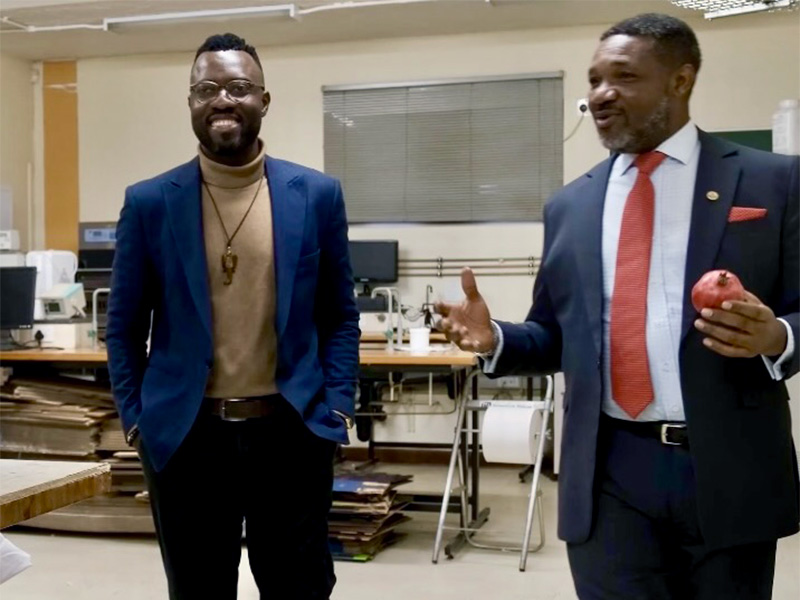
Profs Olaniyi Fawole (left) and Umezuruike Opara (right), discussing advances in postharvest technology | Photo by Stefan Els
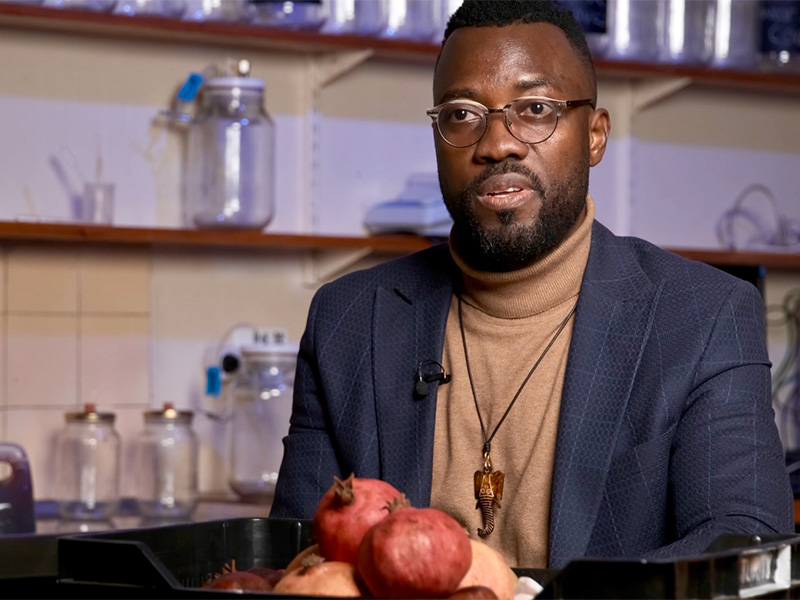
Prof Olaniyi Fawole is one of Prof Umezuruike Opara’s former students and now also one of his regular collaborators. | Photo by Stefan Els
A leader with a legacy
Opara’s SARChI Chair will leave behind a rich legacy.
“I took my chair very seriously. I saw it as my personal role — given my experience around the world — in support of socioeconomic development,” Opara explains.
“We recruited students from all over: South Africa, the rest of the region, and the continent at large.”
He says he makes it his mission to look after his students through means of mentoring, following up with each of them, and giving them further opportunities.
One of Opara’s former students who has since become a fellow academic and a regular collaborator is Prof Olaniyi Fawole. He was appointed professor in postharvest and agro-processing research at the University of Johannesburg after obtaining his PhD under Opara at SU, where he also worked as a researcher after graduating.
Fawole sings Opara’s praises: “He’s more than a supervisor. He’s a teacher, a mentor — everything that one could ask for. He would throw you into the deep end to learn but pull you back soon enough. I like using the word ‘promoter’. He is a promoter, in a unique way.”
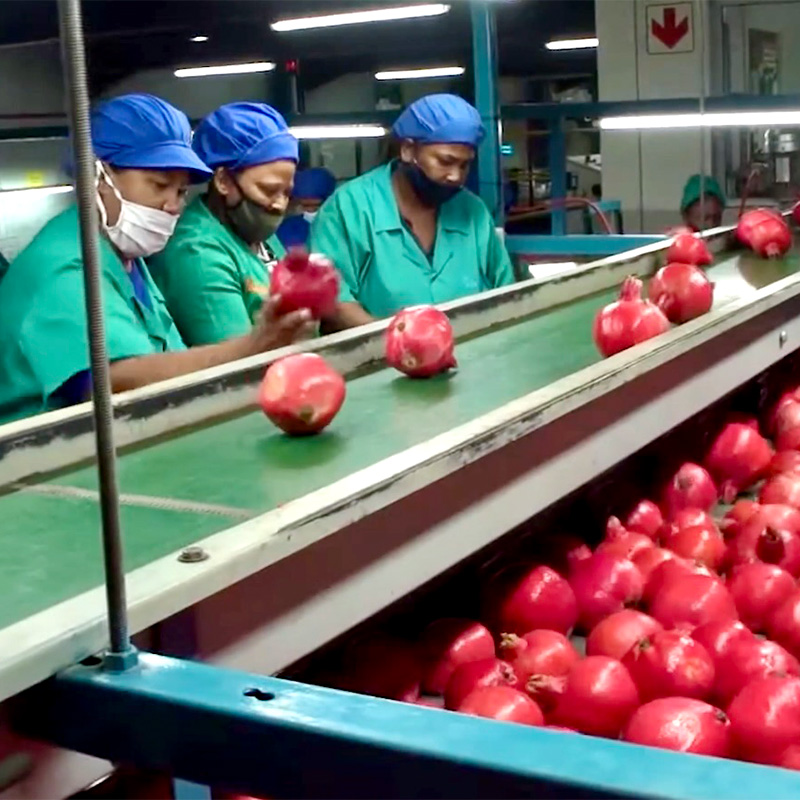
Pomegranates being sorted at a pack house. | Photo courtesy of the Pomegranate Producers Association of South Africa

| Photo courtesy of the Pomegranate Producers Association of South Africa
Paving the way with pomegranates
Fawole played a key role in one of the successes of the SARChI Chair in Postharvest Technology.
Opara explains: “In 2009, when we established the Chair, the pomegranate industry in South Africa was just getting started. I had worked on this deciduous fruit in Oman, and my name came up in the literature.
“So, some farmers who were planting pomegranates in South Africa as a new crop with economic potential came to see me and said, ‘You’re in postharvest. Before we get there, we need to get to the point of harvesting first. Can you help us?’
“I put a PhD student [Fawole] on it and we developed maturity indices [a set of signs that the fruit are ready to be harvested] for pomegranates in South Africa. Then we looked at packaging, storage, and agro-processing — all different elements along the postharvest value chain.”
Today, the pomegranate industry is a rising star in the country’s agrifood system, having grown from around 70 hectares in 2007 to 1 032 hectares in 2021, with the value of exports rising from R33 million in 2012 to R125 million in 2020.
An independent study conducted by the NRF in 2015 on the socioeconomic impact of key national research funding instruments in South Africa concluded that Opara’s research on postharvest technology for pomegranates had “added an estimated R65 million of direct and indirect benefits to the country, with a further R90 million estimated until 2018.”
“The South African pomegranate industry has in recent years developed into an expanding, well-organised export industry. This has led to the creation of many jobs on farms, in pack houses, and in various agro-processing facilities,” Louw Pienaar of the Western Cape Department of Agriculture’s Division for Macro and Resource Economics wrote in a 2021 report, The Economic Contribution of South Africa’s Pomegranate Industry.
Opara can rightly lay claim to advancing contemporary research into one of the world’s oldest known fruits, not only considered a delicacy and healthy food source but also appreciated for its medicinal properties.
Based on research outputs, Opara is now regarded as the leading individual researcher on pomegranates globally, ahead of researchers in such major and long-time producing countries as India, China, the USA, Turkey, Iran, and Israel.
“Our little team here has shown what is possible. And if we could do it for pomegranates, why can it not be done for other value chains across Africa?
“South Africa now leads the world in terms of pomegranate-related generation of new knowledge and postharvest innovation as a result of the output of the SARChI Chair in Postharvest Technology at SU,” he says.
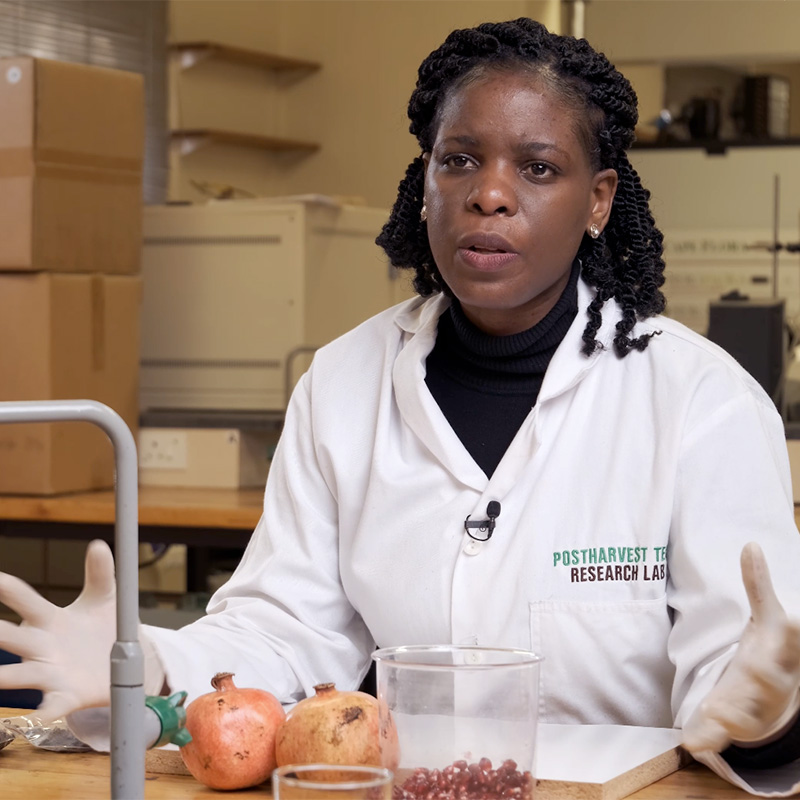
Buhle Maphosa, one of Opara’s students, is investigating the solar drying of pomegranate arils as part of her master's degree. | Photo by Stefan Els

Buhle Maphosa (left) explains her solar drying installation for pomegranate arils to colleagues at Stellenbosch University. | Photo by Stefan Els
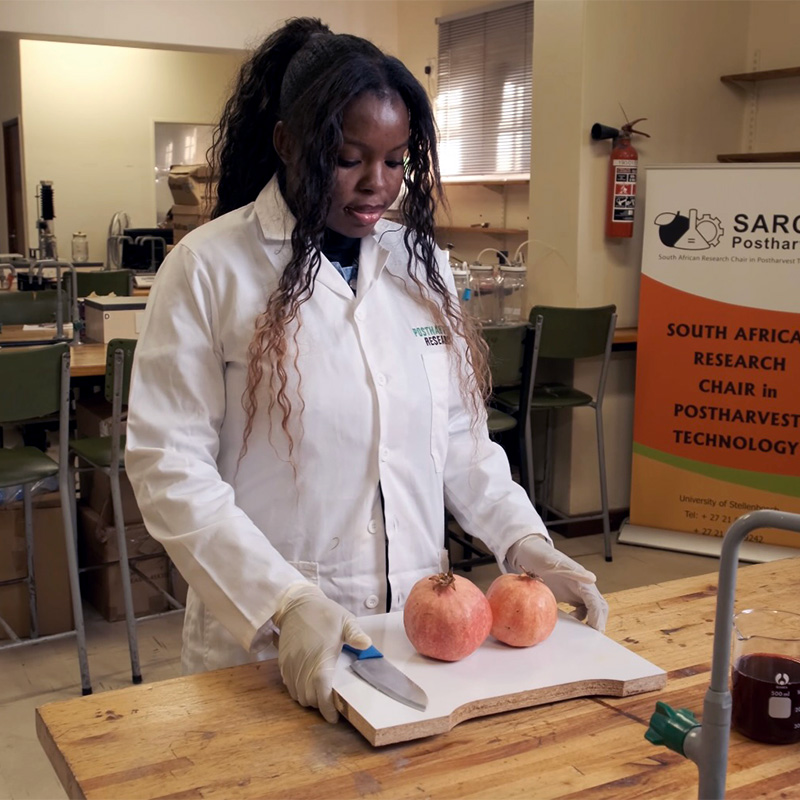
Kasiemobi Ezeora is doing her PhD in postharvest technology at Stellenbosch University under Opara’s guidance. | Photo by Stefan Els
Paying it forward
Kasiemobi Ezeora and Buhle Maphosa are two of Opara’s current students. Ezeora is doing her PhD and Maphosa her master’s degree. Both are going about it in what has become the trademark of the SARChI Chair in Postharvest Technology — an interdisciplinary fashion.
Ezeora is based in the Department of Food Science but is collaborating with the Institute for Wine Biotechnology because she is working on pomegranate wine. She is doing her research under Opara’s supervision because of its focus on postharvest technology.
“Although wine has previously been produced from pomegranates, the fermentation protocol has relied on that established for grape wine production,” she explains.
“Since pomegranate fruits differ from grapes both in composition and internal microbiota, it is necessary to develop a novel fermentation protocol for pomegranate juice. This will result in the development of a new product with distinct qualities.”
Like Ezeora, Maphosa is also based in the Faculty of AgriSciences, but she is collaborating with the Department of Mechanical and Mechatronic Engineering. The postharvest technology that she is investigating is the solar drying of pomegranate arils.
“Arils are the edible seeds or fleshy pulp inside the pomegranate fruit. Drying them extends their shelf life to up to a year, versus about 10 days for fresh ones,” she explains.
“There are various drying methods, including oven, microwave, and freeze drying. What got me interested in solar drying is that it uses renewable energy, which is a global trend. And it’s also low cost. We have so much sun here in South Africa, why not utilise that?”
With these two students being clear examples, Opara says his capacity building “is bearing fruit because now we see all these capable young men and women scattered across South Africa and the rest of the continent, be it in the private sector, public sector or at universities.
“That is why I’m proud to say I’m Afrocentric — in my research, my networking, and my capacity building.”

The research initiatives reported on above are geared towards addressing the United Nations’ Sustainable Development Goals numbers 1, 2 and 5, and goals number 1, 2, 3, 4, and 6 of the African Union’s Agenda 2063.